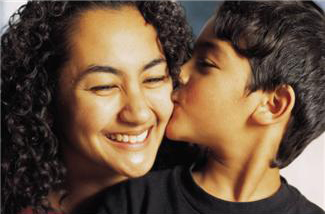
If a parent punishes a child, what does a child learn from that?
‘Punishment’ is a very ugly word and I wish parents would take that word, write it down on a sheet of paper, then wad it up and throw it in the trash because that is where it belongs. The word itself feels heavy on the heart and begs to be spat out of the mouth. When a child hears the word they feel dread and become less than they were before. I want parents to stop using that horrible word. The word I want parents to use in place of that word is DISCIPLINE. Discipline is lyrical, strengthening, uplifting and educating word.
When most parents say punishment, what they really mean is discipline; discipline means ‘to teach or to train.’ Thinking about the lesson a parent teaches when setting a child’s discipline measures can redefine the outcome and be beneficial for the parent/child relationship.
When disciplining a child answer two simple questions:
What do you want a child to learn from the discipline event?
How do you want a child to remember this event when he or she is in their twenties (or forties)?
Remember this: Punishment is punitive. Punishment hurts and pain teaches nothing. Punishment is a self-gratification tool of some parents who may not know any other way to correct except what their parents did to them. Punishment does not belong in the same room with a child. A child may have done something not-so-wise but they do not deserve punishment, they deserve to learn.
Can you think of different ways to discipline or teach a child?
• Allow children to help make rules that are fair
• Time out, to stop and think of a better action
• Be consistent with rules and consequences
• Redirect behavior
• Show how to do things like chores or answering the phone
• Give a do-over
• Use the child’s name respectfully
• Give an extra chore
• Reward good behavior with free treats like time with parent
• Set a time limit
• Problem-solve persistent issues
• Be a good behavior model (no yelling or violence, be calm)
• Give children ownership of their behavior
• Dislike the negative behavior, not the child
• Use grandma’s rule or when/then
• Request of child to teach listening
• Feed into positive behavior and ignore what is unimportant
• Accept genuine mistakes
• Use praise sparingly
• Tell the child how their behavior affects others
• Stay in the parent role, friends are chosen, parents are not
When we teach children properly they learn self-discipline and self-restraint. Isn’t that the ultimate goal?